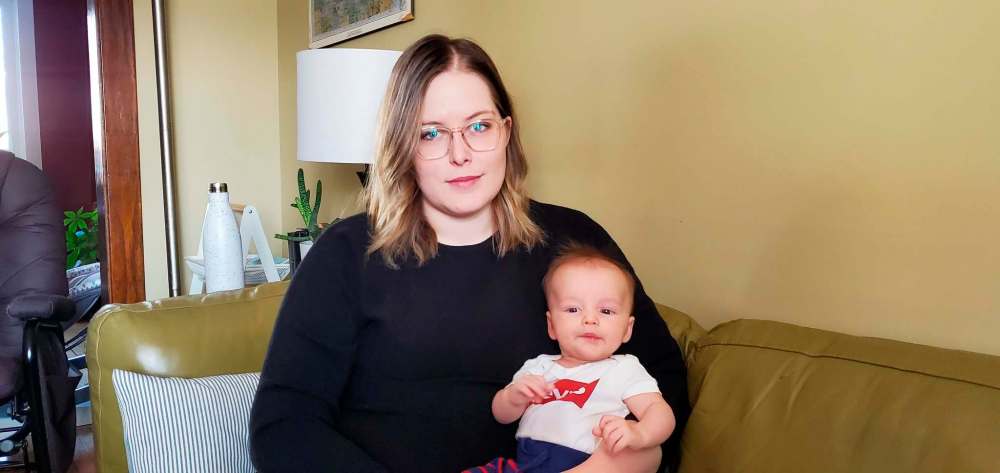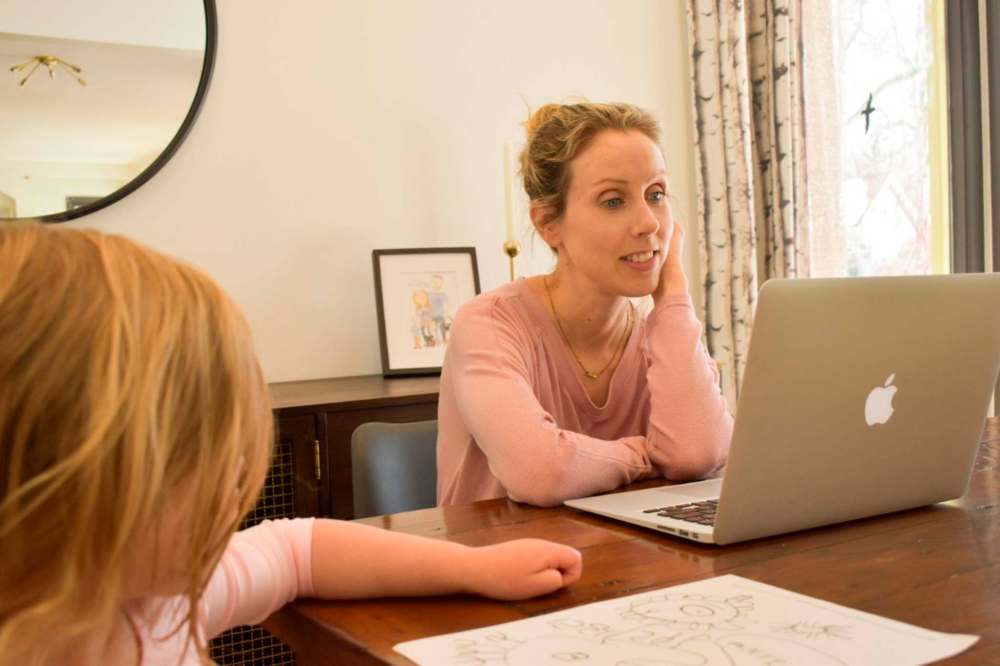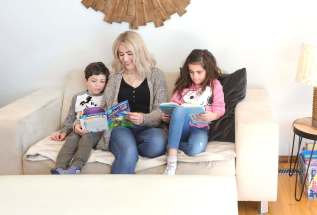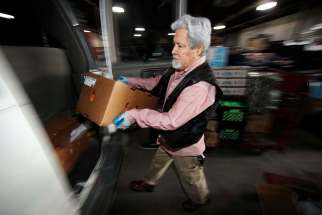Delivering anxiety COVID-19 restrictions mean women getting fewer supports before, during and after birth
Read this article for free:
or
Already have an account? Log in here »
To continue reading, please subscribe:
Monthly Digital Subscription
$1 per week for 24 weeks*
- Enjoy unlimited reading on winnipegfreepress.com
- Read the E-Edition, our digital replica newspaper
- Access News Break, our award-winning app
- Play interactive puzzles
*Billed as $4 plus GST every four weeks. Offer only available to new and qualified returning subscribers. Cancel any time.
Read unlimited articles for free today:
or
Already have an account? Log in here »
Hey there, time traveller!
This article was published 23/03/2020 (1775 days ago), so information in it may no longer be current.
Lexi Deighton is pregnant with her first child. Her due date is this week, but her delivery could be very different from the experience she imagined.
“It couldn’t be worse timing,” says the Winnipeg mother-to-be. “I didn’t make an exact birth plan because I know things often go off the rails — this is more off the rails than I had expected.”
Deighton is about to go into labour in the midst of a global pandemic and a provincial state of emergency that has seen hospitals roll out new policies and screening measures to protect frontline health workers and patients from exposure to COVID-19.
She understands why extra precautions are necessary, but she’s concerned a key member of her birth team, her doula, will be missing from the delivery ward because of the provincial mandate to only allow one support person per patient during medical appointments and hospital visits.

A doula is someone who provides non-medical physical and emotional support to pregnant women and families before, during and after birth.
“She’s been an amazing resource to me throughout this and especially the last couple weeks as things have been escalating,” Deighton said of her doula, Tarana Wheelwright. “Having Tarana there was completely part of the plan and I never would have anticipated that was something that was going to be taken away from me.”
Wheelwright was turned away from the Health Sciences Centre last Thursday when she tried to accompany a client and her husband to the women’s hospital.
Perinatal precautions
The following statement from the Winnipeg Regional Health Authority — which oversees perinatal care at Health Sciences, St. Boniface Hospital and the Women’s Health Centre-operated Birth Centre — outlines the precautions doctors and staff are taking to minimize the spread of COVID-19:
Midwives and physicians are doing phone call appointments when possible. For in-person appointments, visitors are being pre-screened upon arrival, and in some cases over the phone in advance as well. Only pregnant people and one support person are being allowed to attend appointments.
Birth Centre clients may be redirected to the hospital for labour and birth if the screening questions apply to them.
Staff, physicians and midwives are engaging in frequent handwashing, hand sanitizing and practising social distancing — for example, asking that clients give sufficient space between themselves and the front desk staff. Client care areas and waiting areas are being frequently disinfected.
The following statement from the Winnipeg Regional Health Authority — which oversees perinatal care at Health Sciences, St. Boniface Hospital and the Women’s Health Centre-operated Birth Centre — outlines the precautions doctors and staff are taking to minimize the spread of COVID-19:
Midwives and physicians are doing phone call appointments when possible. For in-person appointments, visitors are being pre-screened upon arrival, and in some cases over the phone in advance as well. Only pregnant people and one support person are being allowed to attend appointments.
Birth Centre clients may be redirected to the hospital for labour and birth if the screening questions apply to them.
Staff, physicians and midwives are engaging in frequent handwashing, hand sanitizing and practising social distancing — for example, asking that clients give sufficient space between themselves and the front desk staff. Client care areas and waiting areas are being frequently disinfected.
When there is a risk of air/droplet transmission, midwives are seeing clients in their homes and use personal protective equipment during the visit.
In accordance with provincial recommendations, physicians, midwives and other staff are following the guidelines for screening of Manitoba health care workers if they have returned from international travel within the past 14 days, have flu like symptoms (fever, cough, runny nose, shortness of breath, difficulty breathing, sore throat), have been in contact with an individual with a confirmed or probable positive COVID-19 test and/or are awaiting test results for COVID-19.
— Winnipeg Regional Health Authority spokesperson
“The dad looked at me and said, ‘Rock, paper, scissors?’ “ says Wheelwright, who waited in the parking garage until it was determined her client wasn’t in active labour.
The Winnipeg doula doesn’t want to put extra pressure on the health care system right now, but she does want clarification on how the one-support-person policy is being applied to those in her profession. Over the last week, Wheelwright has heard reports of some doulas being turned away and others being allowed to join their labouring clients in hospital.
“The lack of consistency is a real problem,” she says.
An official for the Winnipeg Regional Health Authority confirmed Monday that the policy does apply to doulas.
“While we certainly value and appreciate the work of doulas in our community, they are not directly employed by a health authority and therefore are not considered staff,” the WRHA official told the Free Press via email. “Thus they are not exempt from the current restrictions on support people during these extraordinary times.”
Wheelwright has several clients approaching their due date and she’s worried about the mental-health implications her absence will have for those families.
“Absolutely women can have a baby without a doula there, we know this… the ones that have it as part of their coping mechanism now feel like they’ve lost one of their tools,” she says. “We’re fortunate that we have excellent labour and delivery nurses that I know are going to be working extra hard to provide that support, but they’re maxed-out too.”
● ● ●
Winnipeg hospitals and health clinics, including the Birth Centre, which is operated by the Women’s Health Clinic, have rolled out screening measures at entrances. All pregnant patients and their support people are being assessed for flu-like symptoms and asked about travel history and contact with those who are awaiting results or have tested positive for COVID-19.
Paige Robertson is 10 weeks pregnant with her second child. She, her husband and their 13-month-old daughter are currently living in self-imposed quarantine after returning from a trip to Australia on March 12.
“Had we known everything that was going to go on we would not have gone,” Roberston told the Free Press over the phone from her home in St. Genevieve.
“…The idea of (giving birth) in like any environment besides a hospital just really sounds awful, but also right now going to a hospital sounds awful.” – Paige Robertson
The news of the pandemic has filled her with anxiety about what the health-care system will look like when she is due this fall and uncertainty about the risks COVID-19 poses to herself and her unborn child.
“A lot of things went wrong with my daughter, so the idea of (giving birth) in like any environment besides a hospital just really sounds awful, but also right now going to a hospital sounds awful,” she says. “I wouldn’t even know what my other options would be.”
According to the World Health Organization, there isn’t enough data yet to determine the impact COVID-19 infections have on pregnant women. The WHO is undertaking research on the subject, but at present there is no evidence they are at higher risk of severe illness than the general population.
During a media conference last Thursday, Dr. Brent Roussin, Manitoba’s chief provincial public health officer, advised extra caution in light of the unknown risks.
“We know that pregnant women are more susceptible to complications related to the flu,” Roussin said. “I would say that they should take the precautions to heart that we are describing here, ensuring social distancing and those that are nearing term should follow the advice from their practitioners on appointments.”
Midwives and physicians in Manitoba have been directed to limit the amount of in-person contact they have with pregnant clients by offering phone and virtual visits.
Sarah Davis is the president of the Midwives Association of Manitoba. In response to COVID-19, she and her colleagues will be reducing the number of in-person prenatal visits with clients from roughly 15 to between six and eight, as recommended by the WHO. Despite the reduced schedule, Davis says essential screenings — like those related to genetics and time-sensitive ultrasounds; as well as blood and gestational diabetes tests — will not be missed.
“Midwives are going to continue to provide all the essential visits… but also, anytime anyone has a clinical concern in their pregnancy we will surely see them,” she says.
According to a memo posted to the Shared Health website, labouring women arriving at a health centre with COVID-19 symptoms will be given a private room. Care team staff will be required to wear personal protective gear and follow enhanced contact precautions.
Mothers with symptoms will still be encouraged to have physical contact with their newborns, including breastfeeding, provided they wear a mask, and wash their hands and any area where skin-to-skin contact may occur.
● ● ●
The pandemic is also causing anxiety for those who have already given birth.
Tanya Palson is two months postpartum and was looking forward to getting out of her house and socializing with other moms and babies.
“I made the joke the other day that I’ve been isolating for two months now,” she says. “It was the light at the end of the tunnel, getting past this newborn stage and getting out and meeting with other moms and having that sort of taken away was a little bit disheartening and kind of sad.”

She had signed up for mommy and me classes and was planning on attending drop-in playgroups at her gym and neighbourhood community centre. Over the last week, all of those programs have been cancelled to meet social distancing recommendations.
“It started to sink in how serious it (is) and how it will really impact my postpartum experience,” Palson says. “I’ve definitely been dealing with some anxiety over the last few days because of that.”
Adding to the anxiety is the fact that most of her family members, including her mother, live outside of Winnipeg and are postponing visits with her and her newborn son, Samuel, out of an abundance of caution.
Palson says she plans to seek out a community online, but is worried what limited exposure to the outside world and other human beings will mean for Samuel’s development.
“This is my first child and you think you’re going to know how you’re going to raise him and what his world is going to be like,” she says. “He’s not going to be around as many people as we’d like, including important family members, but just in general getting him used to other people and socializing him and meeting other babies is all sort of taken away.
“I don’t know what to expect now; there’s no books or tips on how to raise a baby in social isolation”

Hillery Taylor is a registered nurse and the owner-operator of the Nest Family Centre. She decided to close the Stafford Street centre shortly after news broke that COVID-19 had arrived in Manitoba.
“I’ve worked in the hospital system. I know how fragile it can be and because of that I believe it’s my duty to not encourage spiking numbers,” she says.
On an average week, Taylor teaches between two and six pre- and postnatal classes a day, six days a week. She’s moved the bulk of her programming online, but has seen some clients drop out because digital classes aren’t what they signed up for.
When asked how she thinks social isolation will impact child development, Taylor says she isn’t concerned.
“Babies are very adaptable… babies continue to (develop) as long as we protect them physically,” she says. “I’m not as worried about them as I am the moms.”
eva.wasney@freepress.mb.ca
Twitter: @evawasney

Our newsroom depends on a growing audience of readers to power our journalism. If you are not a paid reader, please consider becoming a subscriber.
Our newsroom depends on its audience of readers to power our journalism. Thank you for your support.








